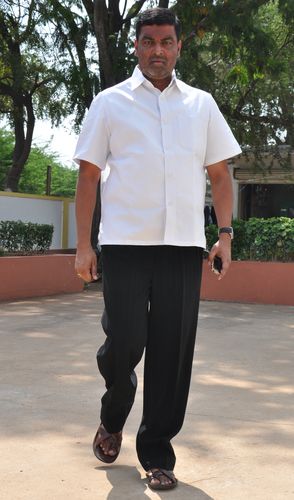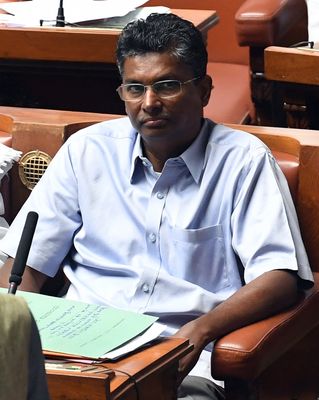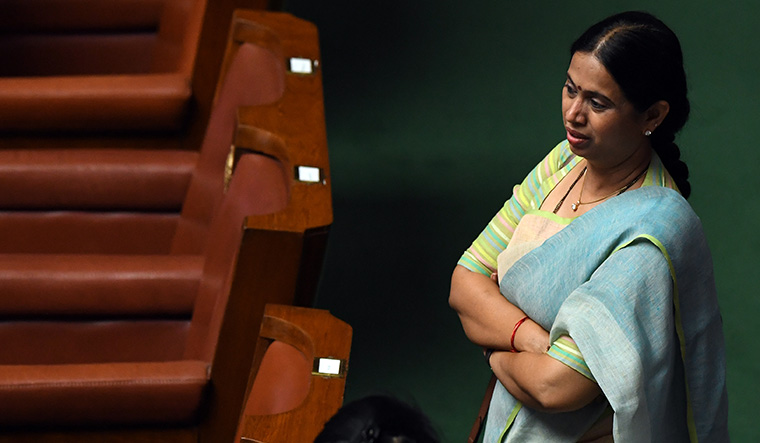THE RECENT POLITICAL turmoil in Karnataka has its roots in Belagavi, the state’s sugar bowl, where a bitter battle for power has been brewing since last August. While the BJP did try to pull off yet another Operation Kamala to topple the Janata Dal (Secular)-Congress coalition, it was aided by the divide and dissent in the Congress. And, at the heart of the rift are the Jarkiholi brothers, the powerful sahukars (feudal lords) of Gokak, in Belagavi district in the Mumbai-Karnataka region. The tussle for political dominance in Belagavi between two chief ministers-in-waiting—D.K. Shivakumar, a Vokkaliga strongman from Old Mysuru region, and Satish Jarkiholi, a Valmiki strongman—has brought the coalition to the brink of a breakup.
Since January, Karnataka has seen ‘resort politics’ by both the BJP and the Congress, a coup attempt by Congress rebels led by Ramesh Jarkiholi, and the ‘audiogate’, a clip of BJP state president B.S. Yeddyurappa allegedly luring JD(S) MLA Naganagouda Kandkur’s son Sharanagouda with money and ministerial berth. There is more to come, say sources.
It all began last August with the elections to a primary land development bank in Belagavi, a politically significant region with 18 assembly segments, next only to Bengaluru with 28 assembly seats. Over the years, many powerful families, mostly sugar barons like the Kattis, Kores, Koujalgis and Jolles, have controlled the politics in Belagavi. The Jarkiholis were new entrants, who set up four sugar factories in 2000—Satish Sugars Ltd, Ghataprabha Cooperative Sugar Mill, Soubhagya Laxmi Sugars and Harsha Sugar Mill. A twist of fate and an excise contract turned Laxmanrao Jarkiholi, a landless labourer from the Bedara-Nayaka (ST) community in Gokak, into a successful businessman. Decades later, his five sons from two marriages—Ramesh, 58, Satish, 56, Balachandra, 52, Bhimshi, 50, and Lakhan, 43—built sugar factories and took the plunge into politics. His four daughters are married into powerful families, too. The Jarkiholis prospered when the region started expanding its area under sugarcane cultivation. Today, Belagavi is the biggest cultivator of sugarcane, overtaking the state’s traditional sugar belt—Mandya in the Old Mysuru region. While many people in Belagavi recall the brothers’ notoriety and their illicit liquor business, the Jarkiholis had a image makeover, thanks to their educational institutions and social and community programmes.
Despite shadowboxing with each other by contesting elections from rival parties, the brothers have stuck together to protect the family’s interest. Three of them are sitting MLAs—Satish (Yamkanmardi) and Ramesh (Gokak) are members of the Congress, while Balachandra (Arabhavi) is with the BJP. The family thus ensures that one of them is a minister at any given time, complain their opponents. While the total assets declared by the three brothers in the last assembly elections was a mere Rs176 crore, with liabilities of Rs57.5 crore, their sprawling bungalows in Gokak give a glimpse of their affluence. And, the family’s stature in Belagavi points to their growing influence in state politics.
Ramesh, the face of the recent revolt in the Congress, was first elected to the Assembly in 1999. In the current Kumaraswamy government, he was made the municipal administration minister. But he boycotted the cabinet meetings, upset with the “inconsequential” portfolio. The party then decided to replace him with his stepbrother Satish, who was made the forests and environment minister. Before going into a huddle along with other rebels in a Mumbai hotel, Ramesh had vowed to make Satish the chief minister. Satish, too, had revolted and resigned from the post of All India Congress Committee secretary in charge of Telangana, as he was annoyed over not getting a cabinet berth in the Kumaraswamy government. The musical chair of brothers in the cabinet is nothing new. Even in the previous Siddaramaiah government, Satish, then excise minister, was dropped and replaced with Ramesh.
Satish, a Siddaramaiah loyalist, followed him out of the JD(S), and is considered to be Siddaramaiah’s saviour, as he ensured his victory in Badami (the second seat he contested from) in the last assembly polls when the former chief minister suffered a humiliating defeat in his home turf, Chamundeshwari. Satish has been retaining his seat since 2008. He served as a member of the legislative council for two terms, starting 1997, before contesting the assembly polls on a Congress ticket. He is one of the most popular leaders from Belagavi, like Prakash Hukkeri, the sitting MP from Chikkodi, and is believed to be the Congress’s answer to BJP’s hugely popular Valmiki leader B. Sriramulu.
While Ramesh keeps a low profile, Satish, though a man of few words, is assertive and people-friendly. Even as he hops in and out of his five-seater Bell helicopter during elections to save time, Satish, a shrewd businessman, has a different side—the Ahinda (Kananda acronym for minorities, dalits and backward classes) leader is a staunch rationalist. He spends the night in a graveyard every December 6—Babasaheb Ambedkar’s death anniversary—to bust myths and superstitions. His dream is to see the evolution of a ‘Kalyan Rajya’ (welfare state) that is devoid of blind practices and superstition. Also, the social arm of Satish Sugars has set up the Nayak Student Federation to provide education to children belonging to the backward communities.
Balachandra, who won the Arabhavi seat twice on a JD(S) ticket, joined the BJP during Operation Kamala in 2008. He won the 2013 and 2018 elections on a BJP ticket. When the Congress rebels were negotiating with the BJP in Mumbai, Balachandra reportedly stayed with Ramesh. Bhimshi, who runs educational institutions in Gokak, had contested against Ramesh on a BJP ticket in 2008, but lost. Lakhan, who is into real estate business, is yet to make his electoral debut and the family is on the lookout for a safe constituency for him. While the Jarkiholis control Gokak, Yamkanmardi and Arabhavi areas, which are dalit strongholds, BJP MLA Umesh Katti and Rajya Sabha member from BJP Prabhakar Kore and the Jolles control the Lingayat dominant region of Belagavi and the Marathi-speaking areas.
The recent political crisis was triggered by water resources minister D.K. Shivakumar from Kanakapura (south Karnataka) flexing his muscles in Belagavi. Shivakumar, who was made the minister in charge of Ballari district, started taking special interest in Belagavi to expand his clout in the Lingayat heartland (north Karnataka) and to earn a pan-Karnataka image. For that, the starting point was the cooperative banks in the region.
The primary land development (PLD) bank in Belagavi had been under the control of the Jarkiholis for decades. As these banks, much like land, control the rural economy, those who control the banks wield immense clout in the region. So, Shivakumar encouraged Ramesh’s protege Laxmi Hebbalkar, Belagavi Rural MLA, to revolt against the Jarkiholis. Party insiders say that Hebbalkar’s proximity to Ramesh had created a rift between the brothers. While Satish opposed her candidacy, Ramesh canvassed for her and secured her victory in the last assembly elections. The brothers were engaged in a cold war after Ramesh proposed Lakhan’s name to contest for the Yamkanmardi seat, stating it was a safe seat for his debut. Satish asked Ramesh to vacate his Gokak seat instead. Insiders in the district Congress unit say it is an “old game” of the Jarkiholis. “Any candidate needs the patronage of the Jarkiholi brothers to win elections. The brothers end up supporting different candidates,” says a Congress leader. But when Hebbalkar fielded her own candidates for the top posts of the PLD bank, the Jarkiholi brothers buried their differences to take on Hebbalkar, whose faction eventually won the PLD bank elections.
The Jarkiholis take revenge seriously, say their supporters. And, Hebbalkar is on their radar. Local residents recall how the brothers had dislodged V.S. Koujalgi, a six-time MLA and former state Congress chief, to launch Balachandra from Arabhavi. In 2014, Balachandra canvassed for Hebbalkar to take on Suresh Angadi, the sitting MP from his own party. Hebbalkar, like in the 2013 assembly polls, lost the Lok Sabha elections owing to infighting.
Satish, however, says, “We brothers chose different parties and hold three seats. But it is not right to say that we do not tolerate anybody’s political growth. Did Shrimant Patil (Kagwad MLA) and Anjali Nimbalkar (Khanapur MLA) not get elected?”
Ramesh and Satish threatened to quit the Congress if Shivakumar was not reined in. While Siddaramaiah initially tried to broker peace between the Jarkiholis and Hebbalkar, he was largely a mute spectator during the latest crisis as he, too, felt lost in the coalition. The Congress sensed trouble as the number of rebels backed by the Jarkiholis kept growing. Ramesh took a group of disgruntled Congress MLAs—Mahesh Kumathalli (Athani), B. Nagendra (Ballari Rural) and Dr Umesh Jadhav (Chincholi), who had been denied ministerial berths or plum board and corporation posts—to Satara in Maharashtra. According to sources, the rebels were assured big money to resign. Ramesh rushed to Delhi to meet BJP president Amit Shah with signatures of 15 rebels. But when they were summoned to Delhi, only five or six MLAs turned up. The handful of rebels went into a huddle in a Mumbai hotel, triggering speculation of a coup by the BJP. The timing coincided with the state BJP herding all its 104 legislators into a resort in Gurugram, allegedly to stall a counter operation by the Congress and the JD(S). A desperate Congress issued whips and notices under the anti-defection law to dissidents, but to no avail. The party eventually asked Shivakumar to stay out of Belagavi politics. Almost a month after shifting base to Mumbai, Ramesh appeared in the assembly during the passage of the crucial financial bill.
While the political storm seems to have subsided with the audio clip expose by Chief Minister H.D. Kumaraswamy, close aides of Ramesh say he may still join the BJP as it has promised to bail him out of his financial crisis. In January 2017, the income tax department had carried out a raid on his residence and offices, and unearthed undisclosed income of Rs162 crore and unexplained cash worth 041 lakh besides 12kg of gold and jewellery.
While the rebels are making excuses for their absence and denying that they were planning to jump ship, Ramesh says he has no issues if the party disqualifies him. Satish, who admits that the Jarkiholis initially had a problem with outsiders interfering in their district, says that his brother’s issues with the party are not new. “Ramesh had a problem even when he was a minister,” he tells THE WEEK. “Now, things have changed and the party has resolved all the issues.”





